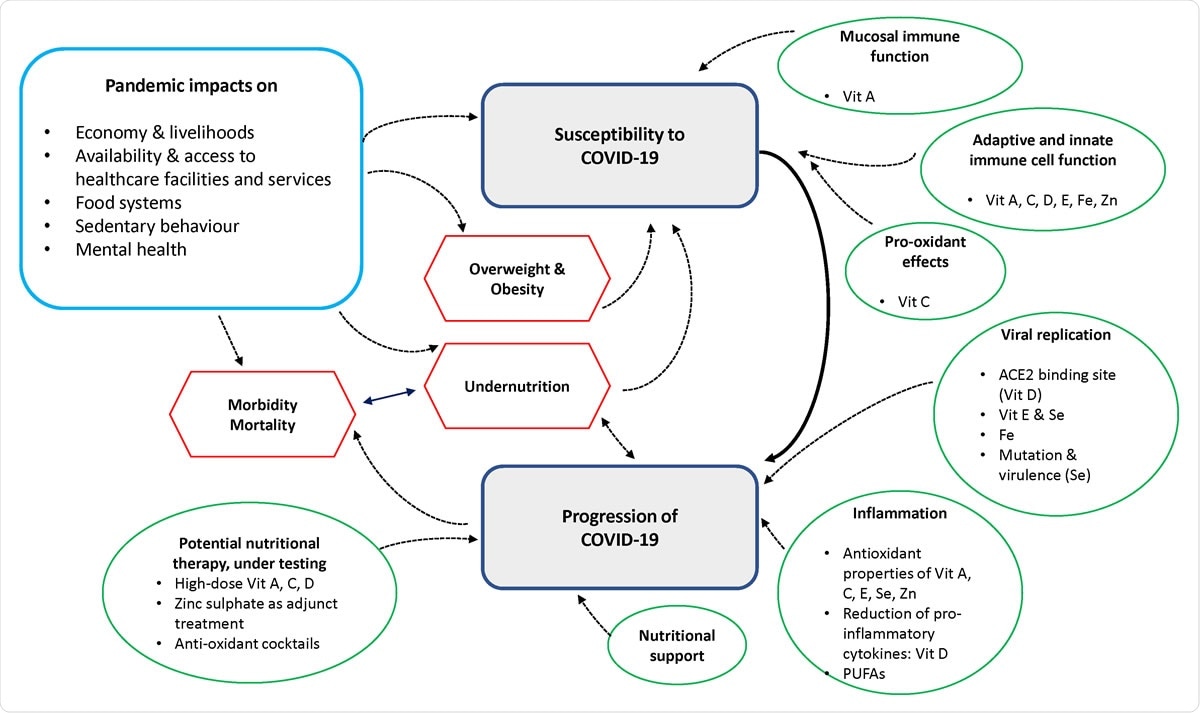Nutrition plays an integral role in maintaining a healthy body, including the immune system to ward off diseases. Amid the coronavirus disease (COVID-19) pandemic, nutritional status has been tagged as a risk factor for developing severe illness, including obesity and malnutrition.

 This news article was a review of a preliminary scientific report that had not undergone peer-review at the time of publication. Since its initial publication, the scientific report has now been peer reviewed and accepted for publication in a Scientific Journal. Links to the preliminary and peer-reviewed reports are available in the Sources section at the bottom of this article. View Sources
This news article was a review of a preliminary scientific report that had not undergone peer-review at the time of publication. Since its initial publication, the scientific report has now been peer reviewed and accepted for publication in a Scientific Journal. Links to the preliminary and peer-reviewed reports are available in the Sources section at the bottom of this article. View Sources
Nutrition and COVID-19
The continuous spread of the severe acute respiratory syndrome coronavirus 2 (SARS-CoV-2), the virus that causes COVID-19, has resulted in a global pandemic, with infections topping more than 41.5 million cases and the death toll reaching more than 1.13 million.
As the pandemic evolves, studies have linked risk factors related to nutrition and the progression of COVID-19. Meanwhile, the pandemic has also exacerbated the risk factors for malnutrition in all its forms. The reasons include alteration in agricultural production and market linkages, which have led to food price increases, and lack of nutritious food items.
Understanding the link between nutritional status and COVID-19 risk is important to produce evidence-based recommendations.

Overview diagram showing key concepts drawn from narrative synthesis
The study
In the study, published on the preprint journal medRxiv*, the researchers synthesized information on 13 nutrition-related components and their relationship with COVID-19 – overweight, obesity, and diabetes, protein-energy malnutrition, vitamins A, C, D, and E, anemia, iron, selenium, zinc, poly-unsaturated fatty acids, antioxidants, and nutritional support.
Of the 13 searches, there were a total of 2,732 articles from EMBASE and PubMed, 4,164 articles from preprint servers, and 433 trials were returned. A total of 288 published and 278 preprint articles were considered for full-text assessment.
Of all the articles, the team arrived at 22 published articles, 39 preprint articles, and 79 trials. The team has found that the studies cover a wide array of mechanistic and observational evidence to underline nutrition's role in the susceptibility and progression of COVID-19. Yet, there is still limited proof that high-dose supplementation of these micronutrients can help prevent infection.
The current study synthesizes the information to add to existing reviews, bringing 13 systematic reviews into one. However, the team said that up to date, there is no conclusive evidence supporting novel nutritional therapies in battling COVID-19. The team said that public health strategies to reduce micronutrient deficiencies and undernutrition are still essential. Further, preventing obesity and type 2 diabetes can also markedly reduce the risk of severe COVID-19.
"To date, there is no evidence supporting the adoption of novel nutritional therapies, although results of clinical trials are eagerly awaited. Given the known impacts of all forms of malnutrition on the immune system, public health strategies to reduce micronutrient deficiencies, undernutrition, and over-nutrition remain of critical importance, drawing on the numerous lessons learned from other viral diseases," the team concluded in the study.
COVID-19 global toll
Understanding ways to prevent and potentially curb the current COVID-19 pandemic is crucial as the virus wreaks havoc across the globe. The total case toll has now reached more than 41.47 million, while the deaths rose to more than 1.13 million.
The United States also reports high numbers of cases, with more than at least 8.4 million cases and more than 222,000 deaths. India follows with more than 7.70 million infections and more than 116,000 deaths.
Other countries who report a high number of cases include Brazil, with more than 5.29 million, Russia, with more than 1.45 million, and France, with more than 1.04 million cases.
As the number of active cases increases and some countries are reporting their second waves, it is crucial always to remember to wash the hands, practice social distancing and wear a mask at all times, especially when outdoors.

 This news article was a review of a preliminary scientific report that had not undergone peer-review at the time of publication. Since its initial publication, the scientific report has now been peer reviewed and accepted for publication in a Scientific Journal. Links to the preliminary and peer-reviewed reports are available in the Sources section at the bottom of this article. View Sources
This news article was a review of a preliminary scientific report that had not undergone peer-review at the time of publication. Since its initial publication, the scientific report has now been peer reviewed and accepted for publication in a Scientific Journal. Links to the preliminary and peer-reviewed reports are available in the Sources section at the bottom of this article. View Sources
Source:
Journal references:
- Preliminary scientific report.
James, P.T., Ali Z., Armitage, A. et al. (2020). Could nutrition modulate COVID-19 susceptibility and severity of disease? A systematic review. medRxiv. https://www.medrxiv.org/content/10.1101/2020.10.19.20214395v2
- Peer reviewed and published scientific report.
James, Philip T, Zakari Ali, Andrew E Armitage, Ana Bonell, Carla Cerami, Hal Drakesmith, Modou Jobe, et al. 2021. “The Role of Nutrition in COVID-19 Susceptibility and Severity of Disease: A Systematic Review.” The Journal of Nutrition, May. https://doi.org/10.1093/jn/nxab059. https://www.sciencedirect.com/science/article/pii/S0022316622002425.